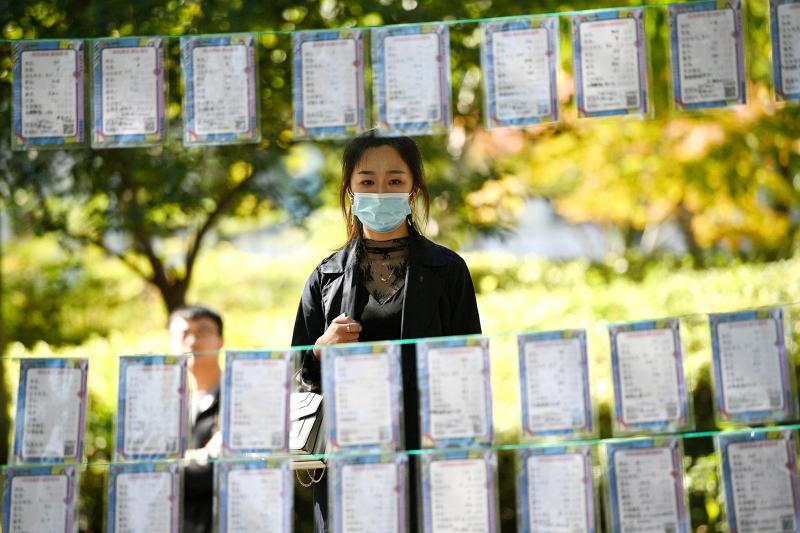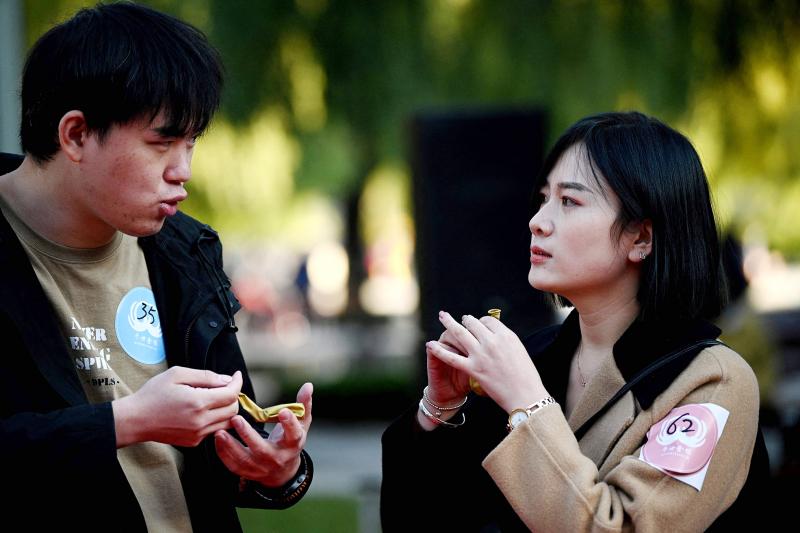Zhang Shaoge wants to get married, but after struggling to meet the right woman through friends and work — he has put his heart in the hands of China’s Communist Party.
As concerns grow over the nation’s falling birth and marriage rates, and the knock-on effect of economic stagnation and an aging workforce, local officials from the CCP’s youth branch are increasingly taking on the role of matchmakers.
Some are organizing more events and introductions for singles struggling to find love.

Photo: AFP
“It’s about time to date and get married at this age. There isn’t anyone suitable around me at the moment, so I wanted to expand my social circle,” 30-year-old Zhang says of his decision to attend an officially-organized event.
Marriage rates have slumped across the nation. 8.14 million couples registered for marriage in 2020 compared with 13.47 million in 2013 according to China’s National Bureau of Statistics(NBS).
Birth rates in the world’s most populous nation plunged to 7.52 births per 1,000 people last year, according to NBS data — the lowest figure since 1949 when Communist China was founded.

Photo: AFP
Due in part to China’s notorious “one-child policy” and a long-standing preference for sons over daughters that led to sex-selective abortions and infanticide, there are tens of millions more men than women.
This gender imbalance for the generation between 1980 and 2016, when the rules were relaxed, is particularly stark in rural areas, adding to a shortage of potential brides.
Zhang, a city-dweller, explains: “I don’t come across many women because of my job.”
He added that he joined the dating event as he is also facing mounting pressure from his family to settle down. He is not alone.
‘MASS MATCHMAKING EVENTS’
More than 100 singles attended a party-backed event in Jinan in China’s eastern province of Shandong. Held in a city park, written profiles of guests detailing ages, fields of work and income were strung up between trees.
A master of ceremonies helped to introduce ice-breaking team games as pop music played in the background.
“I feel more secure (with official events),” says engineer Li Changle. “There are many matchmaking Web sites, but if you fill in your information, you wind up receiving harassing calls,” the 26-year-old adds.
Another participant Xu Feng, 40, concedes he signed up as his family had been “hurrying” him to get married.
“The older I get, the more pressure there is,” he says.
In Anhui province, local officials have turned to technology to connect young people: they have launched a mini program in China’s ubiquitous social media platform WeChat.
Registered members can view information like a person’s surname, height, company and income.
“If you like someone, you can add them as a friend,” explains Communist Youth League representative Li Heng, adding there were “organizational advantages” to its involvement as their notices can reach singles across major companies and industries.
This youth branch of the CCP has in recent years taken on a “key role in sponsoring mass matchmaking events” said Leta Hong Fincher, author of Betraying Big Brother: The Feminist Awakening in China.
“It’s not just the raw birth rate that the government is concerned about,” she says, adding that authorities target college-educated women with propaganda to encourage them into the “politically stabilizing institution” of marriage in order to ensure a “higher quality population.”
‘CAPPING BRIDE PRICES’
Beijing is unwinding decades of strict family planning controls — announcing last May that couples can have three children — and rolling out cooling-off periods for divorce to slow separations.
But rural matchmakers said the gender imbalance — especially stark in the countryside means love and marriage may be out of reach for some.
“Sometimes it’s beyond a 10-to-one ratio,” says Henan province matchmaker Quan Baoyong of the higher proportion of men.
Officials are prioritizing the issue but campaigns can backfire. Last year, a county’s proposal to urge rural women to stay in their hometowns and marry local bachelors sparked a firestorm of criticism online.
Authorities had to clarify they were not trying to force people to stay.
“If I were in my 20s now... I wouldn’t be looking for a wife,” says delivery driver Zhao Liang, noting that the process was “very materialistic now” compared to when he was married. The CCP is targeting “unhealthy” marriage customs by launching pilot reforms to curb “extravagance” such as costly betrothal gifts. Also known as “bride prices,” they are given by the groom’s family and in some Henan villages can be as high as 160,000 yuan (US$25,034) as the gender imbalance sees families battle for suitable women, according to matchmakers.
Some officials have begun to cap the figure at 66,000 yuan in order to make marriage more affordable in rural areas.
“People want you to have a house and a car, even if there is no betrothal gift. That’s at least 500,000 to 600,000 yuan,” Zhao says.
“For a rural family, it’s not easy.”

May 11 to May 18 The original Taichung Railway Station was long thought to have been completely razed. Opening on May 15, 1905, the one-story wooden structure soon outgrew its purpose and was replaced in 1917 by a grandiose, Western-style station. During construction on the third-generation station in 2017, workers discovered the service pit for the original station’s locomotive depot. A year later, a small wooden building on site was determined by historians to be the first stationmaster’s office, built around 1908. With these findings, the Taichung Railway Station Cultural Park now boasts that it has

The latest Formosa poll released at the end of last month shows confidence in President William Lai (賴清德) plunged 8.1 percent, while satisfaction with the Lai administration fared worse with a drop of 8.5 percent. Those lacking confidence in Lai jumped by 6 percent and dissatisfaction in his administration spiked up 6.7 percent. Confidence in Lai is still strong at 48.6 percent, compared to 43 percent lacking confidence — but this is his worst result overall since he took office. For the first time, dissatisfaction with his administration surpassed satisfaction, 47.3 to 47.1 percent. Though statistically a tie, for most

Wooden houses wedged between concrete, crumbling brick facades with roofs gaping to the sky, and tiled art deco buildings down narrow alleyways: Taichung Central District’s (中區) aging architecture reveals both the allure and reality of the old downtown. From Indigenous settlement to capital under Qing Dynasty rule through to Japanese colonization, Taichung’s Central District holds a long and layered history. The bygone beauty of its streets once earned it the nickname “Little Kyoto.” Since the late eighties, however, the shifting of economic and government centers westward signaled a gradual decline in the area’s evolving fortunes. With the regeneration of the once

In February of this year the Taipei Times reported on the visit of Lienchiang County Commissioner Wang Chung-ming (王忠銘) of the Chinese Nationalist Party (KMT) and a delegation to a lantern festival in Fuzhou’s Mawei District in Fujian Province. “Today, Mawei and Matsu jointly marked the lantern festival,” Wang was quoted as saying, adding that both sides “being of one people,” is a cause for joy. Wang was passing around a common claim of officials of the People’s Republic of China (PRC) and the PRC’s allies and supporters in Taiwan — KMT and the Taiwan People’s Party — and elsewhere: Taiwan and